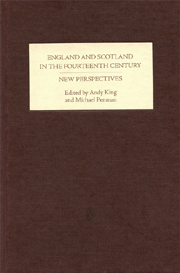Book contents
- Frontmatter
- Contents
- List of Contributors
- Acknowledgements
- Abbreviations
- 1 Introduction: Anglo-Scottish Relations in the Fourteenth Century – An Overview of Recent Research
- 2 The English Army and the Scottish Campaign of 1310–1311
- 3 ‘Shock and Awe’: The Use of Terror as a Psychological Weapon during the Bruce–Balliol Civil War, 1332–1338
- 4 The Scots and Guns
- 5 Edward Balliol: A Re-evaluation of his Early Career, c. 1282–1332
- 6 Scoti Anglicati: Scots in Plantagenet Allegiance during the Fourteenth Century
- 7 Best of Enemies: Were the Fourteenth-Century Anglo-Scottish Marches a ‘Frontier Society’?
- 8 Dividing the Spoils: War, Schism and Religious Patronage on the Anglo-Scottish Border, c.1332–c.1400
- 9 The Pope, the Scots, and their ‘Self-Styled’ King: John XXII's Anglo-Scottish Policy, 1316–1334
- 10 Sovereignty, Diplomacy and Petitioning: Scotland and the English Parliament in the First Half of the Fourteenth Century
- 11 National and Political Identity in Anglo-Scottish Relations, c.1286–1377: A Governmental Perspective
- 12 Anglici caudati: abuse of the English in Fourteenth-Century Scottish Chronicles, Literature and Records
- 13 Anglo-Scottish Relations in the Later Fourteenth Century: Alienation or Acculturation?
- Index
6 - Scoti Anglicati: Scots in Plantagenet Allegiance during the Fourteenth Century
Published online by Cambridge University Press: 12 September 2012
- Frontmatter
- Contents
- List of Contributors
- Acknowledgements
- Abbreviations
- 1 Introduction: Anglo-Scottish Relations in the Fourteenth Century – An Overview of Recent Research
- 2 The English Army and the Scottish Campaign of 1310–1311
- 3 ‘Shock and Awe’: The Use of Terror as a Psychological Weapon during the Bruce–Balliol Civil War, 1332–1338
- 4 The Scots and Guns
- 5 Edward Balliol: A Re-evaluation of his Early Career, c. 1282–1332
- 6 Scoti Anglicati: Scots in Plantagenet Allegiance during the Fourteenth Century
- 7 Best of Enemies: Were the Fourteenth-Century Anglo-Scottish Marches a ‘Frontier Society’?
- 8 Dividing the Spoils: War, Schism and Religious Patronage on the Anglo-Scottish Border, c.1332–c.1400
- 9 The Pope, the Scots, and their ‘Self-Styled’ King: John XXII's Anglo-Scottish Policy, 1316–1334
- 10 Sovereignty, Diplomacy and Petitioning: Scotland and the English Parliament in the First Half of the Fourteenth Century
- 11 National and Political Identity in Anglo-Scottish Relations, c.1286–1377: A Governmental Perspective
- 12 Anglici caudati: abuse of the English in Fourteenth-Century Scottish Chronicles, Literature and Records
- 13 Anglo-Scottish Relations in the Later Fourteenth Century: Alienation or Acculturation?
- Index
Summary
At the beginning of the second decade of the fourteenth century the conflicts termed ‘the Scottish Wars of Independence’ were at a critical stage. From this period two petitions survive written on behalf of the ‘commune’ or ‘people’ of Scotland to their royal lord, seeking his protection and complaining of misgovernment by his officials. In turn, their king clearly sought to alleviate their problems and asked the leaders of this community as his ‘loyal subjects’ for their advice and support in the war. The role played by the community of the realm of Scotland and Robert Bruce's conscious association of ideas of community with his own kingship have long been recognised. However, the ‘commune’ referred to here was not composed of those who regarded Bruce as the rightful defender of Scottish liberties, but his enemies. The two petitions, from between 1311 and 1313, were written by Scots who rejected Bruce's authority and who continued to recognise Edward II king of England as their royal lord. It was Edward's protection they sought and Edward's war effort they aided.
It is easy to regard the claims of these Scottish opponents of Bruce to act as a ‘commune’ as hollow. Between 1310 and 1314 they were a dwindling group. They were confined to Lothian and the borders, exposed to attacks by Bruce's partisans and faced by demands for blackmail to protect their lands. By the end of 1314 these Scots would be forced to choose between submission to King Robert or exile and disinheritance. However, over the longer term, the existence of Scots who adhered to the English king and even claimed to act as a community demonstrates an element of the Anglo-Scottish conflicts which has generally been underplayed.
- Type
- Chapter
- Information
- England and Scotland in the Fourteenth CenturyNew Perspectives, pp. 94 - 115Publisher: Boydell & BrewerPrint publication year: 2007



